For obvious reasons, I try not to spend too much time on social media these days. But the algorithm sent me something that made me smile last week: a video uploaded to the Mammut YouTube channel called Heart of the Mountain. The 10-minute film put a spotlight on Shames, the ski hill outside Terrace that’s recently been gaining recognition for its deep powder, low-key vibe, and easily accessed backcountry terrain.
But this wasn’t your typical highlight reel of backflips, face shots, and steep spines. The Heart of the Mountain in question was Shames’ unique ownership model: it’s a non-profit, volunteer-run ski hill, fully owned and operated by the local community.
If you don’t know the story: in 2008, struggling to stay afloat, the owners of Shames announced it would be their final season of operations. Locals rallied together and founded a cooperative to purchase the mountain and keep it open for the community. Individuals and businesses bought in, raising a few hundred thousand dollars, and by 2011 a purchase agreement was reached. The ski hill passed into community ownership, where it’s been ever since.
For $299, anyone in the community can become a member of the My Mountain Co-Op that owns Shames. Members drive the strategy and direction for the mountain, and over the last 15 years, they’ve worked to keep the lifts spinning while making skiing and snowboarding accessible and affordable. The resort is open four days a week, with uphill access the rest of the time. A kid’s season pass costs just $126 and school lessons start at $25/day.
The community in Shames has built something special and rare: a ski hill that’s just for skiing. They might only have two lifts, but I’m pretty sure the locals have just as much fun skiing pow laps on a Thursday morning as we do. And I bet the lift lines are shorter, too.
If this all sounds too good to be true, let me bring you back down to Earth. In 2023-24, Shames reported revenues of $1.6 million with a net operating loss of $55,000. Reading their reports, there’s no mistaking the love, passion, and energy the community pours into the mountain. But you also can’t miss the daily grind to figure out how to spin chairlifts, groom pistes, and sell lift passes while staying in the black—the day-to-day reality of running a ski hill not-for-profit.
Still, Shames’ story questions so many of our assumptions about what it means to run a ski resort. In a town where our mountains drive $1.27 billion of consumer spending every year, our beloved winter sports now feel inexorably commercial. But while it might feel as though there’s no other way, Shames is a quiet reminder there is.
And I don’t just mean another way to run a ski hill. I’m happy to leave that to the experts. I mean a different way to solve problems, as a community. To me, Shames is a story about what happens when a community decides to take control of its own future. These days, it’s easy to feel powerless. Whistler may be a bubble, but we’re not insulated from the increasing volatility of our economy, politics, and climate. And as individuals, it often feels like there’s nothing we can do—that we just have to play with the cards we’re dealt.
But Shames’ story challenges that belief. In a tough moment, a small community came together and took control. No single person had the power to change their fate, but together they did. Passionate, driven, ordinary people decided they didn’t like what was coming for them, and they took it upon themselves to create an alternative.
They didn’t take the obvious path, or the easy path, or the path to guaranteed success. Instead, they did something hopeful, bold, difficult, and kind of crazy. They took a risk, and prioritized their shared vision over short-term gains. They didn’t know how to get there when they set off. I’m sure sometimes they disagreed, hit roadblocks, and felt overwhelmed. I wonder if, even now, they feel they’ve succeeded, or whether the daily grind means “success” always feels just out of reach?
But then, just like skiing, the destination was never the point. The story of Shames is about the journey: about people solving problems together and sticking with it when it got hard, in the hope that it might just work out. It’s a story about showing up, day in, day out, and creating something together.
I can’t help finding a lesson for Whistler in all this. We talk so much about the challenges we’re facing—housing, food insecurity, the climate crisis—and we all sometimes feel powerless in their wake.
But the thing is, there’s nothing inherently different about the locals at Shames. They didn’t have particular knowledge, power, or resources that made them uniquely able to do something bold in a moment of crisis. They just had a dream, they trusted each other, and then they showed up and got started.
Whistler has always been a place for dreamers—so what’s stopping us from getting started?
Lizi McLoughlin is a local non-profit leader, an average-but-enthusiastic mountain athlete, and an eternal optimist.




